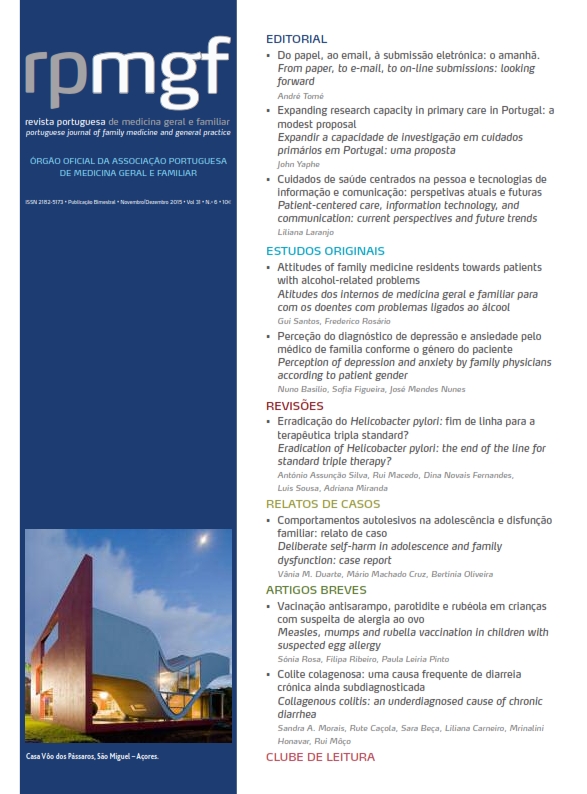Family Medicine residents’ attitudes towards patients with Alcohol-Related Problems
DOI:
https://doi.org/10.32385/rpmgf.v31i6.11490Resumen
Objectives: to evaluate family medicine residents’ attitudes towards patients with alcohol-related problems.
Study design: cross-sectional study.
Participants: family medicine residents registered at the Lisbon’s Family Medicine Residency Coordination.
Methods: attitudes towards alcohol-related problems were assessed using the Short Alcohol and Alcohol Problems Perception Questionnaire. Associations were tested between questionnaire scores, gender and postgraduate training year.
Results: one hundred and ninety five residents meeting inclusion and exclusion criteria answered the questionnaire. The mean residents’ age was 29.2 years, and 74.4% were female. Residents felt role secure in working with drinkers (88.7% scored above Role Security scale midpoint) but reported lower levels of Therapeutic Commitment (57.9% scored above scale’s midpoint). Although residents showed on average positive attitudes, they considered working with drinkers an unpleasant task, since only 22.6% scored above Satisfaction’s subscale midpoint. Male and female residents reported similar attitudes towards drinkers in all questionnaire’s domains (all P>0.05), and their attitudes remain unchanged throughout training (all P>0.05).
Conclusions: residents’ attitudes towards patients with excessive alcohol consumption remain unchanged as they go through residency training. Inclusion of alcohol specific training modules into the residency programme that take residents’ attitudes into account may help to improve residents’ willingness to engage with patients with alcohol-related problems.
Descargas
Publicado
Número
Sección
Licencia
Los autores otorgan a RPMGF el derecho exclusivo de publicar y distribuir en medios físicos, electrónicos, de radiodifusión u otros medios que pueda existir el contenido del manuscrito identificado en esta declaración. También otorgan a RPMGF el derecho de usar y explorar el presente manuscrito, es decir, de ceder, vender o licenciar su contenido. Esta autorización es permanente y entra en vigor desde el momento en que se envía el manuscrito, tiene la duración máxima permitida por la legislación portuguesa o internacional aplicable y tiene un alcance mundial. Los autores declaran además que esta transferencia se realiza de forma gratuita. Si la RPMGF informa a los autores que ha decidido no publicar su manuscrito, la cesión exclusiva de derechos cesa inmediatamente.
Los autores autorizan a RPMGF (oa una entidad que éste designe) a actuar en su nombre cuando considere que existe una infracción a los derechos de autor.





